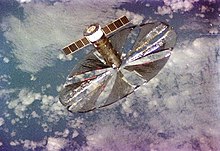Znamya (satellite)
 Znamya satellite | |
| Mission type | experiment |
|---|---|
| Operator | Russian Federal Space Agency |
| Spacecraft properties | |
| Spacecraft | The Znamya project |
| Dimensions | 20 m space solar mirror |
| Start of mission | |
| Launch date | October 27, 1992 |
| Rocket | Progress M-15 |
| Launch site | Baikonur |
| Deployment date | February 4, 1993 |
| End of mission | |
| Disposal | Atmospheric Re-entry |
The Znamya project (Russian: Знамя, meaning "Banner", Russian: [ˈznamʲə] ⓘ) was a series of orbital space mirror experiments in the 1990s that intended to beam solar power to Earth by reflecting sunlight. The project was the brain child of Vladimir Syromyatnikov, who served as the project's lead engineer.[1] Originally devised as a solar sail, Syromyatnikov pivoted to using the proposed hardware as a space mirror. The project consisted of two experiments: the Znamya 2 experiment and the failed Znamya 2.5, plus the proposed Znamya 3. After the failed deployment of the Znamya 2.5 the project was abandoned by the Russian Federal Space Agency .
Znamya 2
[edit]The Znamya 2 was a 20-metre wide space solar mirror. Znamya-2 was launched aboard Progress M-15 from Baikonur on 27 October 1992. After visiting the EO-12 crew aboard the Mir space station the Progress T-15 then undocked and deployed the reflector from the end of the Russian Progress spacecraft on 4 February 1993, next to the Russian Mir space station. The mirror deployed successfully, and, when illuminated, produced a 5 km wide bright spot, which traversed Europe from southern France to western Russia at a speed of 8 km/s.[2] The bright spot had a luminosity equivalent to approximately that of a full moon.[3] Although clouds covered much of Europe that morning, a few ground observers reported seeing a flash of light as the beam swept by.[4]
The mirror was de-orbited after several hours and burned up in atmospheric reentry over Canada.[5][6]
The Znamya mirror had originally been designed as a prototype of a solar sail propulsion system,[4] but was repurposed as a space mirror for illumination when interest in solar sails flagged.
Znamya 2.5
[edit]The Znamya 2.5 was a successor to the Znamya 2, which was deployed on 5 February 1999. It had a diameter of 25 m, and was expected to produce a bright spot 7 km in diameter, with luminosity between five and ten full moons. However, soon after deployment, the mirror caught on an antenna on the Progress, and ripped. After several vain attempts by Russian mission control to free the mirror from the antenna, the Znamya 2.5 was de-orbited, and burned up upon reentry.[7][3][8]
Znamya 3
[edit]The Znamya 3 was intended to be a scaled-up version of the previous two Znamyas, with a diameter of 60–70 metres. It was never built, as the project was abandoned after the failure of the Znamya 2.5.[2]
References
[edit]- ^ Lewis, Danny. "How a Russian Space Mirror Briefly Lit Up the Night". Smithsonian Magazine. Retrieved 23 August 2024.
- ^ a b Znamya Space Mirror, space-frontier.org, 5 February 1999 (archived)
- ^ a b "Space Mirror". The Triz Journal. 15 June 2002. Archived from the original on 18 October 2017. Retrieved 17 October 2017.
- ^ a b Tim Folger, "New moon – Russian satellite acts as a mirror to light remote areas", Discover, Jan, 1994 (web version Archived 20 September 2008 at the Wayback Machine, (Retrieved 29 August 2008)).
- ^ McDowell, Jonathan (10 February 1993). "Jonathan's Space Report – No 143 – Mir". Jonathan's Space Report. Jonathan McDowell. Archived from the original on 6 December 2012. Retrieved 25 February 2007.
- ^ Wade, Mark. "Mir EO-12". Encyclopedia Astronautica. Mark Wade. Archived from the original on 17 February 2004. Retrieved 25 February 2007.
- ^ Znamya - what went wrong? Archived 8 November 2012 at the Wayback Machine, BBC News 5 February 1999
- ^ Wade, Mark. "Mir News 453: Znamya 2.5". Encyclopedia Astronautica. Mark Wade. Archived from the original on 3 June 2006. Retrieved 25 February 2007.
External links
[edit]- "Space Mirror, N.Shpakovsky.
